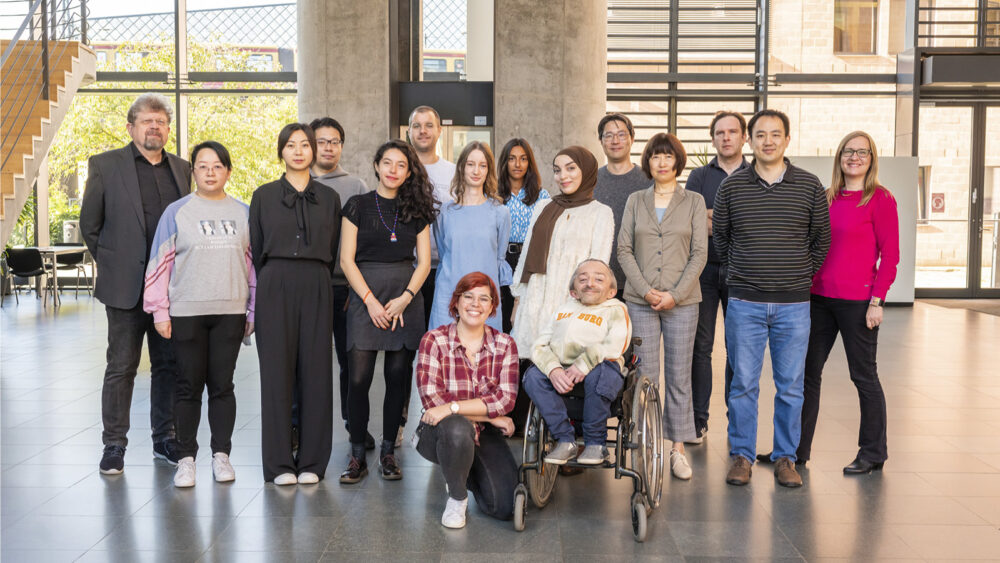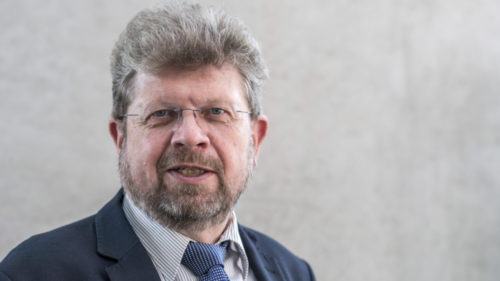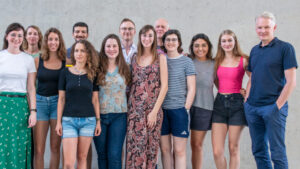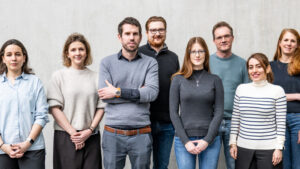

Radbruch lab
How does the immune system cause chronicity in rheumatic inflammation?
Cell Biology
There are many diseases which we refer to as “childhood diseases”, because we typically get infected with them as children and then are never bothered by them again. This is due to certain immune cells – the memory lymphocytes – protecting us against getting the same disease again, for the rest of our lifetime. Rheumatic inflammation is caused by pathogenic memory lymphocytes that attack our own body. We are investigating how these pathogenic memory lymphocytes drive inflammation into chronicity, why they do not or only poorly respond to current therapies, and how they can be selectively switched off. Our aim is to make the patients’ immune system “forget” the chronic rheumatic inflammation.
An indication of how (rheumatic) chronic inflammation can initiate is provided by the severe disease course in COVID-19 patients who require intensive, prolonged medical care. In collaboration with the research group Mashreghi, we have studied the immune response of these patients over time. The early acute immune reaction induced by the SARS-CoV-2 virus is directed against the virus. However, later the immune reaction is no longer directed against the virus, rather against the patient’s own body. When memory lymphocytes are formed in this immune reaction, the inflammation becomes chronic, and it will no longer respond to therapies that suppress acute immune reactions.
Our group discovered some time ago memory plasma cells, which as we have shown in collaboration with the research group of Falk Hiepe, play a central role in chronic inflammations caused by antibodies, e.g. in systemic lupus erythematosus (SLE). Patients with such pathogenic memory plasma cells cannot achieve therapy-free remission, i.e. be cured, at best their disease symptoms can be suppressed. These memory plasma cells are refractory to conventional therapies and continue to secrete their disease-driving antibodies undeterred. We are looking for novel approaches to target these cells therapeutically, from a basic understanding of how and where these cells survive in the body. We have shown that memory plasma cells are mainly located in the bone marrow and in inflamed tissues, where they attach to certain connective tissue cells. And we have shown that the plasma cells need contact with these stromal connective tissue cells to survive. Now we are deciphering the molecular code of the synapse between both cells, and how this translates into survival for different types of plasma cells, protective and pathogenic ones. For the first time, this may open up options for selectively eliminating pathogenic plasma cells, and ablating the cells causing chronic rheumatic inflammation driven by antibodies.
The precursors of memory plasma cells are memory B lymphocytes, which also control chronic inflammation themselves, together with memory T lymphocytes. Unexpectedly for the experts, we have now been able to show for the first time that most memory B lymphocytes, similar to memory plasma cells, are found in the bone marrow, where they also attach to connective tissue cells and do not circulate through the body via blood. We suspect that they are also maintained and survive in a similar way to plasma cells and are therefore resistant to conventional therapies. Even more surprising is that we could identify many different types of memory B lymphocytes. We are now investigating whether the pathogenic B lymphocytes in arthritis patients belong to a particular subset, which would enable us to target them selectively.
Together with memory B lymphocytes, memory T lymphocytes control immune reactions, especially the development of memory plasma cells, but also cytokine-mediated chronic inflammation, independent of antibodies. We were able to demonstrate this in Juvenile Idiopathic Arthritis (JIA): a type of arthritis affecting children. We detect these harmful memory T-lymphocytes mainly in the inflamed tissue itself, e.g. in the inflamed joints, where they actively control the chronic inflammation by secretion of cytokines, alarming other cells, and chemokines, attracting and activating effector cells. In order to survive in the joints, the memory T lymphocytes have to adapt to the inflammatory environment. We have identified genes that enable this adaptation, such as the transcription factor TWIST1 and the microRNA miR-148a. We could show that TWIST1 adapts the metabolism of the cells to the environment of the inflamed tissue and prevents death of the cells by switching on miR-148a, and antagonist of the pro-apoptotic gene BCL-2. In a mouse model of intestinal inflammation, we have already been able to selectively kill the harmful memory T lymphocytes in the animals, with “antagomirs” blocking mir-148a, without targeting protective memory T lymphocytes. This is the first indication that it is indeed possible to therapeutically ablate pathogenic memory T lymphocytes in a targeted manner.
Keywords
Immunological memory
Rheumatic inflammation
Chronic inflammation
Plasma cell
Antibody
Memory lymphocyte

Group leader
Prof. Dr. rer. nat Andreas Radbruch
Scientists
Jun Dong, PhD
PhD students
Xiangyi Deng
Lukas Heiberger
Jinchan Li
Pedram Mahmoudi
Emilia Schneider
Yu Shen
Zixu Wang
Charité – Universitätsmedizin Berlin, Germany:
- Gerd-Rüdiger Burmester, Klinik für Rheumatologie und klinische Immunologie
- Tobias Alexander, Klinik für Rheumatologie und klinische Immunologie
- Anja Kühl, Medizinische Klinik I
- Thomas Dörner, Klinik für Rheumatologie und klinische Immunologie
- Georg Duda, Julius Wolff Institut für Biomechanik und Muskuloskeletale Regeneration
- Thomas Häupl, Klinik für Rheumatologie und klinische Immunologie
- Falk Hiepe, Klinik für Rheumatologie und klinische Immunologie
- Silvia Pade, Klinik für Rheumatologie und klinische Immunologie
- Britta Siegmund, Medizinischen Klinik für Gastroenterologie, Infektiologie und Rheumatologie
- Klemens Budde, Dr. Mareen Matz, Nephrologie
Andere / Others
- Andreas Bosio, Dr. Ute Bissels, Dr. Anne Richter, Miltenyi Biotec GmbH, Bergisch Gladbach, Germany
- Alexander Scheffold, Universitätsklinikum Schleswig-Holstein, Germany
- Wei Chen, Max-Delbrück-Centrum für Molekulare Medizin und Berlin Institute for Medical Systems Biology, Berlin, Germany
- Steffen Gay, Zentrum für Experimentelle Rheumatologie, Universitätspital Zürich, Switzerland
- Hans-Martin Jäck, Molekulare Immunologie, Universitätsklinikum Erlangen, Germany
- Thomas Kamradt, Institut für Immunologie, Universitätsklinikum, Friedrich-Schiller-Universität, Jena, Germany
- Toshinori Nakayama, Department of Immunology, Chiba University, Chiba, Japan
- Nikolaus Rajewsky, Max-Delbrück-Centrum für Molekulare Medizin und Berlin and Institute for Medical Systems Biology, Berlin, Germany
- Andreas Thiel, Berlin-Brandenburg Center for Regenerative Therapies BCRT, Berlin, Germany
- Kai Wucherpfennig, Dana-Farber Cancer Institute, Boston, MA, USA
- Michael Lohoff, Institut für Medizinische Mikrobiologie, Philipps University Marburg, Germany
- Radbruch A, McGrath MA, Siracusa F, Hoffmann U, Sercan-Alp Ö, Hutloff A, Tokoyoda K, Chang HD, Dong J. Homeostasis and Durability of T-Cell Memory-The Resting and the Restless T-Cell Memory. Cold Spring Harb Perspect Biol. 2021 Apr 26:a038083. doi: 10.1101/cshperspect.a038083. Epub ahead of print. PMID: 33903153.
- Maschmeyer P, Chang HD, Cheng Q, Mashreghi MF, Hiepe F, Alexander T, Ich Radbruch A. Immunological memory in rheumatic inflammation – a roadblock to tolerance induction. Nat Rev Rheumatol. 2021 Apr 6. doi: 10.1038/s41584-021-00601-6.
- Ferreira-Gomes M, Kruglov A, Durek P, Heinrich F, Tizian C, Heinz GA, Pascual-Reguant A, Du W, Mothes R, Fan C, Frischbutter S, Habenicht K, Budzinski L, Ninnemann J, Jani PK, Guerra GM, Lehmann K, Matz M, Ostendorf L, Heiberger L, Chang HD, Bauherr S, Maurer M, Schönrich G, Raftery M, Kallinich T, Mall MA, Angermair S, Treskatsch S, Dörner T, Corman VM, Diefenbach A, Volk HD, Elezkurtaj S, Winkler TH, Dong J, Hauser AE, Radbruch H, Witkowski M, Melchers F, Radbruch A, Mashreghi MF. SARS-CoV-2 in severe COVID-19 induces a TGF-β-dominated chronic immune response that does not target itself. Nat Commun. 2021 Mar 30;12(1):1961. doi: 10.1038/s41467-021-22210-3. PMID: 33785765.
- Maschmeyer P, Heinz GA, Skopnik CM, Lutter L, Mazzoni A, Heinrich F, von Stuckrad SL, Wirth LE, Tran CL, Riedel R, Lehmann K, Sakwa I, Cimaz R, Giudici F, Mall MA, Enghard P, Vastert B, Chang HD, Durek P, Annunziato F, van Wijk F, Radbruch A, Kallinich T, Mashreghi MF. Antigen-driven PD-1+ TOX+ BHLHE40+ and PD-1+ TOX+ EOMES+ T lymphocytes regulate juvenile idiopathic arthritis in situ. Eur J Immunol. 2020 Dec 9. doi: 10.1002/eji.202048797. Epub ahead of print. PMID: 33296081.
- Ostendorf L, Burns M, Durek P, Heinz GA, Heinrich F, Garantziotis P, Enghard P, Richter U, Biesen R, Schneider U, Knebel F, Burmester G, Radbruch A, Mei HE, Mashreghi MF, Hiepe F, Alexander T. Targeting CD38 with Daratumumab in Refractory Systemic Lupus Erythematosus. N Engl J Med. 2020 Sep 17;383(12):1149-1155. doi: 10.1056/NEJMoa2023325. PMID: 32937047.
- Romero-Olmedo AJ, Schulz AR, Huber M, Brehm CU, Chang HD, Chiarolla CM, Bopp T, Skevaki C, Berberich-Siebelt F, Radbruch A, Mei HE, Lohoff M. Deep phenotypical characterization of human CD3+ CD56+ T cells by mass cytometry. Eur J Immunol. 2021 Mar;51(3):672-681. doi: 10.1002/eji.202048941. Epub 2020 Dec 15. PMID: 33231295.
- Cornelis R, Hahne S, Taddeo A, Petkau G, Malko D, Durek P, Thiem M, Heiberger L, Peter L, Mohr E, Klaeden C, Tokoyoda K, Siracusa F, Hoyer BF, Hiepe F, Mashreghi MF, Melchers F, Chang HD, Radbruch A. Stromal Cell-Contact Dependent PI3K and APRIL Induced NF-κB Signaling Prevent Mitochondrial- and ER Stress Induced Death of Memory Plasma Cells. Cell Rep. 2020 Aug 4;32(5):107982. doi: 10.1016/j.celrep.2020.107982. PMID: 32755576; PMCID: PMC7408492.
- Riedel R, Addo R, Ferreira-Gomes M, Heinz GA, Heinrich F, Kummer J, Greiff V, Schulz D, Klaeden C, Cornelis R, Menzel U, Kröger S, Stervbo U, Köhler R, Haftmann C, Kühnel S, Lehmann K, Maschmeyer P, McGrath M, Naundorf S, Hahne S, Sercan-Alp Ö, Siracusa F, Stefanowski J, Weber M, Westendorf K, Zimmermann J, Hauser AE, Reddy ST, Durek P, Chang HD, Mashreghi MF, Radbruch A. Discrete populations of isotype-switched memory B lymphocytes are maintained in murine spleen and bone marrow. Nat Commun. 2020 May 22;11(1):2570. doi: 10.1038/s41467-020-16464-6. PMID: 32444631; PMCID: PMC7244721.
- Beller A, Kruglov A, Durek P, von Goetze V, Werner K, Heinz GA, Ninnemann J, Lehmann K, Maier R, Hoffmann U, Riedel R, Heiking K, Zimmermann J, Siegmund B, Mashreghi MF, Radbruch A, Chang HD. Specific microbiota enhances intestinal IgA levels by inducing TGF-β in T follicular helper cells of Peyer’s patches in mice. Eur J Immunol. 2020 Feb 17. doi: 10.1002/eji.201948474.
- Minden K, Radbruch A, Burmester GR, Strangfeld A. Das Was, Wie und Warum in der rheumatologischen Versorgung [The what, the how and the why in rheumatological research]. Z Rheumatol. 2020 Dec;79(10):967-968. German. doi: 10.1007/s00393-020-00908-x. Epub 2020 Dec 1. PMID: 33258973.
- Alexander T, Badoglio M, Henes J, Heesen C, Arnold R, Radbruch A, Snowden JA, Hiepe F. Autologe hämatopoetische Stammzelltransplantation bei Autoimmunerkrankungen : Aktuelle Indikationen und Wirkungsweise, ein Review der EBMT Autoimmune Diseases Working Party (ADWP) [Autologous hematopoietic stem cell transplantation for autoimmune diseases : Current indications and mode of action, a review on behalf of the EBMT Autoimmune Diseases Working Party (ADWP)]. Z Rheumatol. 2020 Jun;79(5):419-428. German. doi: 10.1007/s00393-020-00795-2. PMID: 32356079.
- Sarkander J, Hojyo S, Mursell M, Yamasaki Y, Wu TY, Tumes DJ, Miyauchi K, Tran CL, Zhu J, Löhning M, Hutloff A, Mashreghi MF, Kubo M, Radbruch A, Tokoyoda K. Enhanced Cell Division Is Required for the Generation of Memory CD4 T Cells to Migrate Into Their Proper Location. Front Immunol. 2020 Jan 15;10:3113. doi: 10.3389/fimmu.2019.03113. PMID: 32010148; PMCID: PMC6974474.
- Hradilkova, K, Maschmeyer P, Westendorf K, Schliemann H, Husak O, von Stuckrad SL, Kallinich T, Minden K, Durek P, Grün JR, Chang HD, Radbruch A. T helper lymphocytes of chronic inflammation are maintained by fatty acid oxidation and adapt to it through Twist1. Arth Rheumatol. 2019. doi: 10.1002/art.40939
- Siracusa F, Durek P, McGrath MA, Sercan-Alp Ö, Rao A, Du W, Cendón C, Chang HD, Heinz GA, Mashreghi MF, Radbruch A, Dong J. CD69+ memory T lymphocytes of the bone marrow and spleen express the signature transcripts of tissue-resident memory T lymphocytes. Eur J Immunol. 2019 Jan 23. doi: 10.1002/eji.201847982
- Chang HD, Tokoyoda K, Hoyer B, Alexander T, Khodadadi L, Mei H, Dörner T, Hiepe F, Burmester GR, Radbruch A. Pathogenic memory plasma cells in autoimmunity. Curr Opin Immunol. 2019 Dec;61:86-91. doi: 10.1016/j.coi.2019.09.005.
- Cheng Q, Pelz A, Taddeo A, Khodadadi L, Klotsche J, Hoyer BF, Alexander T, Thiel A, Burmester GR, Radbruch A, Hiepe F, Selective depletion of plasma cells in vivo based on the specificity of their secreted antibodies. Eur J Immunol. 2019 Nov 12. doi: 10.1002/eji.201948144
- Cossarizza A, Chang HD, Radbruch A et al Guidelines for the use of flow cytometry and cell sorting in immunological studies (second edition). Eur J Immunol. 2019 Oct;49(10):1457-1973. doi: 10.1002/eji.201970107.
- Addo RK, Heinrich F, Heinz GA, Schulz D, Sercan-Alp Ö, Lehmann K, Tran CL, Bardua M, Matz M, Löhning M, Hauser AE, Kruglov A, Chang HD, Durek P, Radbruch A, Mashreghi MF.Single-cell transcriptomes of murine bone marrow stromal cells reveal niche-associated heterogeneity. Eur J Immunol. 2019 Sep;49(9):1372-1379. doi: 10.1002/eji.201848053. Epub 2019 Jun 7.
- TRR130 Teilprojekt 16 (Radbruch/Chang): Deciphering the Survival Code of Memory Plasma Cells and Memory B Cells
- TRR241 Teilprojekt B03 (Chang/Radbruch): The intestinal epithelial cells in the dialogue between microbiota and the immune system
- EU H2020 IMI2 RTCure: WP3 (Project leader Chang/Radbruch)
- EU H2020 IMI2 3TR
- BMBF Forschungsverbund Neuroimpa (Neuroimmunologie und Schmerz)
- DFG 389687267 (Radbruch/Dong)

 Deutsch
Deutsch
